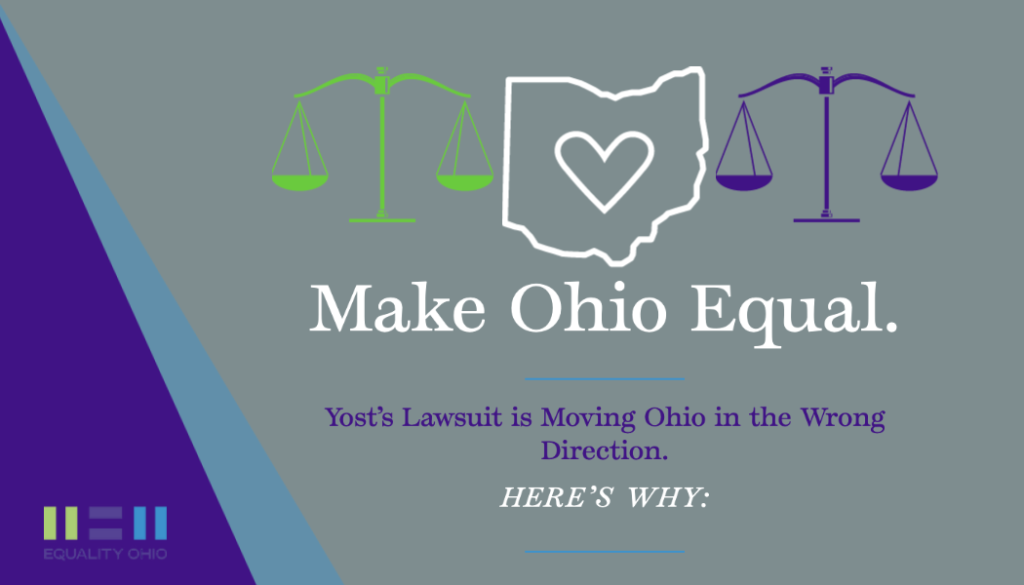LGBTQ+ Ohioans are experiencing an uptick in legislative attacks in 2021. This general assembly, state lawmakers are attempting to pass bills that seek to exclude transgender and non-binary athletes from sports and ban teaching about the fluidity of gender identity in the classroom.
Now, Ohio Attorney General Dave Yost’s office has added Ohio to a federal lawsuit that continues to move Ohio in the wrong direction.
In September, Ohio Attorney General Dave Yost and 19 other state attorneys general, filed a lawsuit against the Biden Administration for clarifying the way that federal agencies interpret the term ‘sex’ in federal nondiscrimination law.
The lawsuit, filed in the U.S. District Court for the Eastern District of Tennessee, essentially argues that the reasoning in the 2020 court case Bostock v. Clayton County cannot be extended into Title IV and other federal and state guidance.
Bostock v Clayton County is a 2020 Supreme Court case in which the Court held that the Civil Rights Act of 1964 protects LGBTQ+ employees against discrimination. In this case, the Court clarified that ‘sex’ discrimination always includes sexual orientation and gender identity, emphasizing that one’s sexual orientation or gender identity are inextricably linked to the concept of ‘sex.’. After taking office, President Biden signed an executive order recognizing that Bostock’s reasoning applies to all federal laws prohibiting sex discrimination and committed the Executive Branch to enforcing all such federal laws as prohibiting discrimination based upon sexual orientation and gender identity.
Yost and other state attorneys general disagree with the way in which the language of the case is being implemented into law. They make three key arguments about why.
First, they argue that Bostock v. Clayton County is a narrow ruling that does not set precedent in other areas of discrimination law.
Our Take: When the Supreme Court clarifies the meaning of a legal term—like ‘sex’—that interpretation creates a legal precedent that will affect other cases also interpreting the word. In fact, Bostock is solid case law that is being correctly implemented just like other Supreme Court precedents. Federal Agencies such as the Equal Opportunity Employment Commission (EEOC), the Department of Education, and the Department of Justice have all issued guidance correctly implementing Bostock language into their legal interpretations.
Second, the lawsuit argues that a Tennessee law with more a narrow, less-inclusive interpretation of discrimination should not be preempted by federal law on this topic, and that since Tennessee law does not recognize trans and non-binary people, neither should the federal courts. This part of the lawsuit has to do with preemption, a legal term that means that a law at a higher level of government will take precedence over a conflicting law at a lower level. For example, state laws are upheld over conflicting local laws, and federal laws are upheld over conflicting state laws. But this lawsuit is arguing the alternative—that Tennessee law should prevail upwards over the federal guidance stemming from the Supreme Court’s Bostock ruling.
Our Take: Federal preemption is a legal standard that is consistent across all state and federal law, including court cases. There’s no reason why Tennessee law—which happens to have some of the most anti-LGBTQ+ laws in place in the country—should preempt federal law.
Third, their argument is heavily focused on terms and definitions, stating that facilities should be allowed to discriminate based on “biological sex” and that transgender and non-binary people simply do not count because their “biological sex” does not match their gender identity.
Our Take: It’s important to keep in mind that “biological sex” is not a commonly used term, either in the law and in medical literature. The term ‘sex’ has long been understood to mean not only someone’s genital makeup or genes, but also their gender identity and sexual orientation. This is a key part of understanding the Bostock ruling, because the case held that all discrimination on the basis of sex also includes discrimination based upon a person’s gender idenity and sexual orientation. Bostock made clear that discrimination on the basis of sex is “inextricably linked” to and includes always includes gender and sexual orientation.
It’s also important to emphasize that using the term “biological sex” is a conservative talking point used to erase transgender and non-binary people’s voices from the conversation. Transgender women are women. Transgender men are men. Transgender nonbinary people are nonbinary. This lawsuit seeks to state otherwise, and uses incorrect terminology to make the point.
This lawsuit not only goes against current legal precedent, but Attorney General Yost’s actions also go against what Ohioans want. According to a 2019 study conducted by the Public Religion Research Institute (PRRI), 68% of Ohioans support nondiscrimination protections for LGBTQ+ people, including many people of faith and people across political parties.
Ohioans also believe that nondiscrimination protections are good for business. Ohio Business Competes, a nonpartisan coalition of more than 1,150 Ohio Businesses that believe nondiscrimination protections are right for Ohioans, shows that Ohio believes in protecting the LGBTQ+ community and that not doing so harms Ohio both socially and economically.
This lawsuit’s argument is even inconsistent with Ohio’s executive branch’s interpretation of discrimination. Ohio’s current governor, Mike DeWine, signed an executive order protecting LGBTQ+ employees from discrimination in Ohio during his first moments in office.
To be clear, Bostock remains the law of the land. Recently, the Supreme Court decided against even hearing a case (Grimm v. Gloucester County School Board) in which a transgender student sued his high school for the right to use the restroom that aligned with his gender identity. In Grimm, the transgender student won, and denying him the right to access facilities congruent with his gender identity was held to violate Bostock. The fact that the Supreme Court chose not to hear further arguments in this case is a win. It suggests that Bostock will ultimately be correctly applied to all areas of ‘sex’ discrimination.
One thing this lawsuit does show is that those who oppose LGBTQ+ equality are still fighting hard to keep discriminatory policies in place. We are deeply disappointed that AG Yost would sign onto this lawsuit, and we reject his claim that he is joining merely for legalistic reasons. Equality Ohio will continue to watch this lawsuit for developments.
This suit also makes abundantly clear that we need clarity in our laws at the state and federal level. It is far past time for us to pass the Ohio Fairness Act and the Equality Act. We encourage you to continue to push for hearings on the Ohio Fairness Act in Ohio and the Equality Act at the federal level, to continue to advance lived and legal Equality everywhere.
Join Equality Ohio in the fight for lived and legal equality by attending one of our upcoming Advocacy Nights.




 @
@